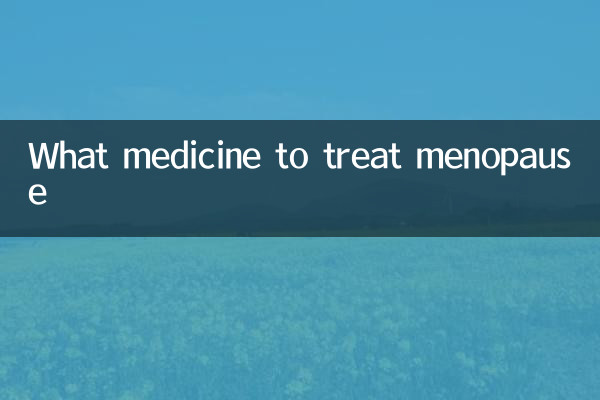What medicine treats menopause? Hot topics and scientific interpretations of the entire network in the past 10 days
Menopause is an important stage of female physiological transition, and the popularity of related topics has continued to rise in recent years. This article will combine popular discussions across the entire network for nearly 10 days (as of October 2023) to analyze menopausal treatment plans from a scientific perspective and provide structured data references.
1. Top 5 popular topics on menopause treatment in the entire network

| Ranking | Topic keywords | Discussion volume (10,000) | Main focus |
|---|---|---|---|
| 1 | Hormone replacement therapy | 28.6 | Security and applicable groups |
| 2 | Traditional Chinese medicine conditioning | 19.3 | Classic prescriptions and individualized solutions |
| 3 | Phytoestrogen | 15.2 | Soy isoflavones effect |
| 4 | Non-pharmacological therapy | 12.8 | Exercise and diet management |
| 5 | New targeted drugs | 9.4 | NK3 receptor antagonists |
2. Comparison of commonly used menopausal treatment drugs in clinical practice
| Drug Type | Representative medicine | Mechanism of action | Applicable symptoms | Things to note |
|---|---|---|---|---|
| Hormone replacement | Estradiol/progesterone compound preparation | Estrogen supplement | Hot flashes, osteoporosis | Thrombosis risk needs to be strictly evaluated |
| Plant medicine | Black Cohosh Extract | Regulate neurotransmitters | Emotional fluctuations, sleep disorders | It needs to be taken for 4 weeks to take effect |
| Chinese patent medicine | Kunbao Pills | Tonify kidney yin | Excessive sweating, palpitations | Stop using it when you have a cold |
| Targeted drugs | Fychopitan | NK3 receptor blockade | Stubborn hot flashes | Need for prescription |
3. Experts recommend treatment plan
1.Stepped treatment principle: Priority should be given to lifestyle adjustments (regular exercise + calcium supplementation), and drug intervention should be considered for the above symptoms.
2.Individualized medication: People with high cardiovascular risk should use hormones with caution, and selective estrogen receptor modulators (SERMs) can be used.
3.Combination of traditional Chinese and Western medicine: Data shows that the symptom relief rate increased by 23% in patients with combined hormone replacement and traditional Chinese medicine conditioning (2023 Journal of Gynecological Endocrinology).
4. Three key issues that have been hotly discussed recently
1.Carcinogenic risk of hormone therapy: The latest meta analysis shows that the risk of breast cancer increases by <0.1% within 5 years of standardized use, but it needs to be evaluated every year.
2.Menopausal medication: Controversy over testosterone supplemental therapy continues, and the FDA requires an increase in cardiovascular risk warning labels.
3.Digital Therapy Rises: Many menopause management APPs have been certified for medical devices and can assist in monitoring symptom changes.
5. Statistics on the feedback of patients’ real medications
| Drug Type | Satisfaction | Key advantages | Common complaints |
|---|---|---|---|
| Hormone patch | 82% | Fast results (within 2 weeks) | Skin irritation |
| Livmin films | 76% | No hormone components | Higher price |
| Kuntai Capsules | 68% | Improve sleep | Slow onset |
Conclusion:There is no "universal drug" for menopause treatment. It is recommended to choose a plan based on symptom characteristics, underlying diseases and personal preferences under the guidance of a gynecological endocrinologist. Recent studies have shown that cognitive behavioral therapy combined with low dose drugs can achieve the best cost-effectiveness ratio (JAMA Internal Medicine, 2023.9).

check the details

check the details